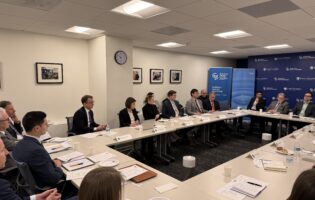Center-Right Parties and Immigration in Germany and the U.S.
On 27 October 2015, AGI convened a seminar with DAAD/AGI Research Fellow Georg Menz, who presented his findings on “Center Right Parties and Immigration in Germany and the United States.” Dr. Menz began his presentation by explaining that most of the existing literature on immigration policy has focused on the position of far-right parties. He, on the other hand, decided to study center-right immigration positions in both Germany and the United States, which he argues have shifted quite drastically. To put the immigration issue into context, Dr. Menz provided some immigration figures. For instance, it is estimated that Germany has received over 1.2 million applications for asylum this year, which is more than any six-year span in the late twentieth century. Sixty-nine percent of the immigrants this year to Germany are male. Additionally, 70 percent of new immigrants entering the dual-tier vocational system in the state of Bavaria, meant to cushion the integration process. There are also numerous problems with crime among the new immigrants—crime rates for new immigrants in Germany have tripled over the past three years, ranging from shoplifting to assault and rape. The above-mentioned problems, Dr. Menz argues, are homemade and are the result of Germany’s immigration policies. Dr. Menz then turned his attention to the United States, where, he argues, immigration has been on the front-burner for the past fifteen years. As in Germany, federal immigration law in the United States is poorly executed and has resulted in an undocumented population of between 11 and 20 million.
Dr. Menz researched the Republican Party in the United States and the CDU in Germany. Contrary to his previous hypothesis, there is no liberalization of immigration sentiment or policy in either the United States or Germany, but rather a movement to the right. The polarized climate in both the United States and Germany makes it difficult to pass federal immigration policy. Conservative parties are divided between a pro-immigration business wing and a much more socially conservative and often nativist voter clientele. This makes it difficult to devise a mutually acceptable middle ground position. In addition, the dominant policy mode in immigration policy in the sense of Gary Freeman and James Q. Wilson has changed. We are now witnessing entrepreneurial politics at the state and local level, consisting of diffused benefits and concentrated costs. Polarization and gridlock at the federal level remain, leaving room for entrepreneurs, who use state-level and local policy initiatives, which reflect the right-leaning views of the populace. These “wildcats” are changing immigration policy, which, as a result, is becoming more democratized. Most Europeans and Americans agree that something needs to be done to combat illegal immigration. Entrepreneurial politics is not a stable policy mode; it is volatile by nature. The United States and Germany have moved out of elitist policy and have, in some ways, become more responsive to public opinion and more pluralist, though mainly at the local level. This, Dr. Menz argues, has not been an altogether healthy change for the political systems, especially in regard to immigration, which poses serious threats to the existing social structures.
Georg Menz is a DAAD/AGI Research Fellow in September and October 2015. He is Professor of Political Economy at Goldsmiths College, University of London. He has published widely on the politics and policies of immigration as well as Comparative Political Economy. His main monographs include Varieties of Capitalism and Europeanization: National Response Strategies to the Single European Market (2005) andThe Political Economy of Managed Migration: National Non-State Actors and Europeanization in the Formulation of European Immigration Policies (2009). He has also published articles in such journals as Journal of European Public Policy, Journal of Ethnic and Migration Studies, Comparative European Politics, and Journal of Common Market Studies.
Location
AICGS R. G. Livingston Conference Room
1755 Massachusetts Ave NW Suite 700 Washington, DC 20036 United States







